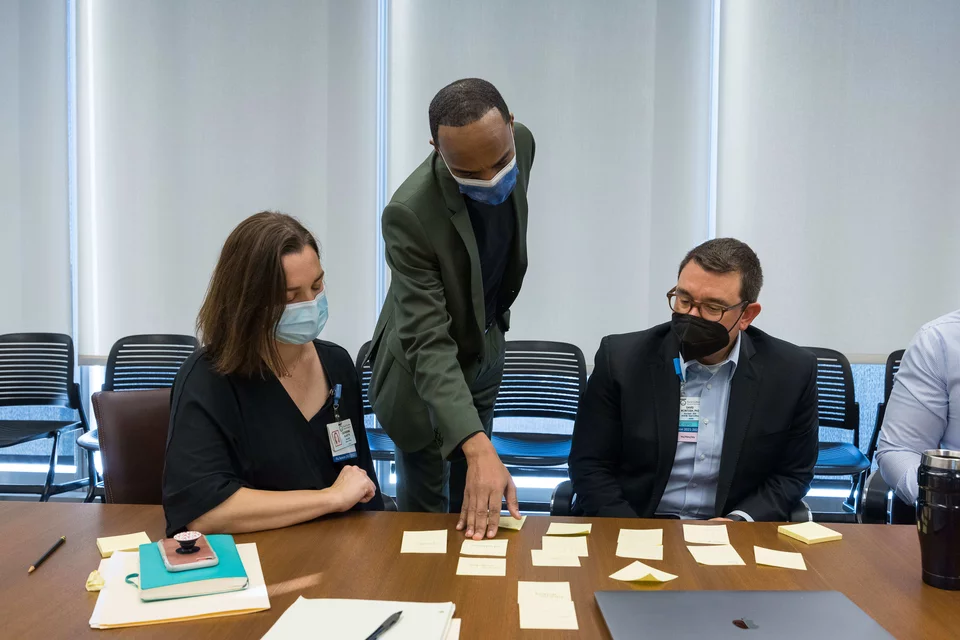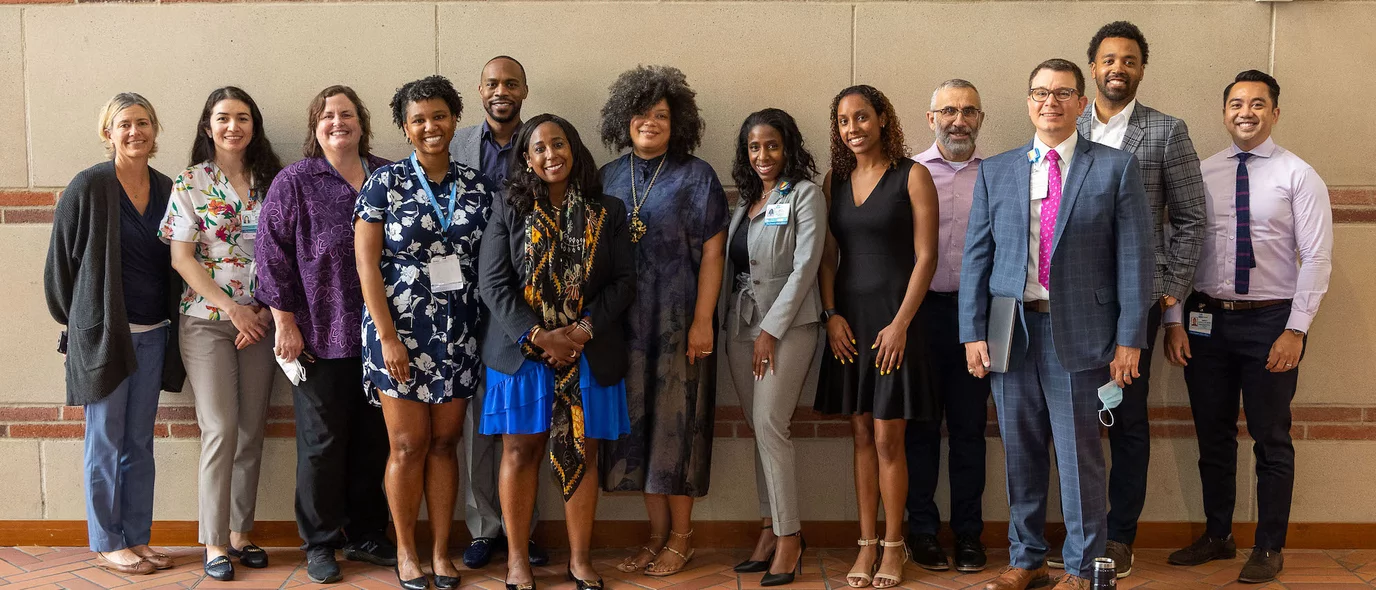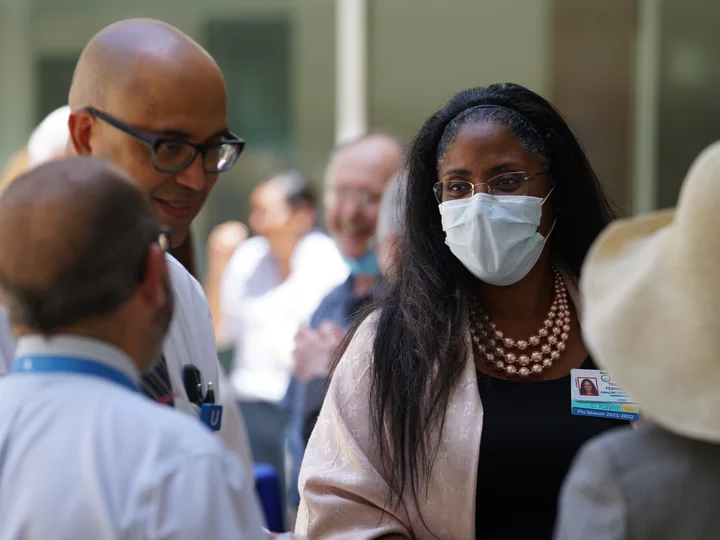Justice, Equity, Diversity, and Inclusion
The DGSOM Office of Inclusive Excellence (OIE) deepened connections and partnerships across UCLA to build greater capacity for this important work.
A strong relationship and partnership with the UCLA Health System Office of Health Equity, Diversity, and Inclusion (HEDI) has allowed our offices to grow together and develop a joint strategic plan (called the JHEDI Plan). Further, the connection with the UCLA EDI Office has enabled important thought collaboration and strategic alignment.
The OIE team also grew, with the addition of new team members dedicated to leading the work of the Anti-Racism Roadmap and the Cultural North Star.
Strategic OIE Plan
The OIE Plan is focused on a decentralized approach to address six key strategic priority areas. Each department appointed a OIE Lead who is a member of the senior leadership team. Together with the department chair, each OIE Lead developed a plan with goals, tactics, and assessments for each of the six areas.
In the interests of accountability and transparency, each department documents and reports on their goals, tactics, and assessment annually. There is a one-day symposium scheduled for April 2023 that will be attended by our DGSOM, UCLA Health System, and UCLA main campus leadership, as well as all of our Department Chairs. In this symposium, each Chair presents their progress from the past year and receives feedback from our OIE Committee suggesting opportunities for future directions.

People
Each department will consider its headcount or presence data and create a plan for how the presence of those who are underrepresented can be improved.
Climate
Each department will focus on their data describing the lived experience in the department and create a plan for improving those areas where people are made to feel marginalized.
Structural Equity
Each department will consider how things such as policies, practices, and procedures impact their department implicitly, sometimes with negative consequences for those who are marginalized or underrepresented. Each department will choose two policies or practices annually to examine on the basis of equity by identity or background (such as race, gender identity, disability, etc.). If an inequity is found, the department will be asked to put together a plan to correct the inequity.
Professional Development
Each department will focus on their professional development and education of OIE concepts for their faculty, staff, and learners. Departments will utilize the climate data and other sources to chart a path for learning in areas of greatest need in the department.
Community Engagement
Each department will consider how they engage with the community that is outside the walls of DGSOM/UCLA Health. We are asking each department to consider partnering in the community to understand what the community needs, rather than what are we willing to do with the community.
Patient Care
Each department will consider what equitable care should look like for the different types of care provided, followed by an analysis to understand how well the department meets that standard.
OIE Initiatives
In 2022, the OIE Office launched several new initiatives and continued to build on existing successful programs.

The goal of the Bruin Scholars, which launched in Fall 2022, is to support the retention of UCLA residents, fellows and post-docs in their transition to faculty. This support helps ensure their success as junior faculty who are committed to our DGSOM mission and values. The program focuses on our mission of serving the greater Los Angeles community. Bruin Scholars have a commitment to justice, equity, diversity, inclusion, anti-racism, and service to underserved populations. Bruin Scholars receive the necessary support to develop their academic interests and build leadership experience.
The ARR leadership team published an update on institutional progress in each of the 11 focus areas. The team will share information and answer questions during a series of thematically organized events scheduled through the end of the 2022-23 academic year. The ARR website contains additional information on this update and series.
The OIE and HEDI Offices partnered to launch a novel climate assessment. The final assessment garnered a 50% response rate, which is exceptionally strong for an equity, diversity, and inclusion climate instrument. The action plan will be developed and results shared in 2023.
The JAM Council was launched in Fall 2021 and provides a one-year fellowship that includes mentoring training with a focus on navigating intersectional barriers to success and promotion in academic medicine. Drawing on principles of inclusive excellence, the curriculum provides extensive coaching, networking, and mentoring opportunities aimed at expanding the professional development and retention of diverse faculty in academic medicine. The curriculum relies on a national mentoring model called CIMERS, which is an evidence-based approach for mentoring. There are 21 mentees currently in the program who are mentored by 14 senior faculty.
In collaboration with the AAPI Faculty Alliance and the BLNA Collective affinity groups, the OIE Office launched a new award program called the OIE Trailblazer, which is an opportunity to recognize the individual journey of DGSOM leaders. Our inaugural honorees are Drs. Linda Liau, Arthur Gomez, and Mary Marfisee.
DGSOM was one of 11 medical schools across the U.S. and Canada selected to participate in the Anti-Racist Transformation in Medical Education Program. The program aims to strengthen the approach to anti-racism through collaboration with peer institutions and program leaders.
Student activists submitted a Racial Justice Report Card (RJRC) which includes research findings and practical recommendations for the DGSOM executive leadership team. The student group then met with leadership to review the report and plan next steps. During the next phase of the work, students and leaders will engage additional stakeholders for the RJRC and develop accountability and implementation plans.
OIE leadership works with OIE affinity groups, EDI representatives, and faculty to support mentoring and other efforts that foster an equitable climate in medical education. This includes everything from program development and execution to structural change at the institution that empowers our learners and improves the climate.
OIE continues to collaborate with Graduate Medical Education (GME) programs to ensure a diverse and inclusive community for all trainees. Ongoing outreach efforts include partnering with the Minority Housestaff Organization (MHO) to host our fourth annual “Road to Residency Program.” The Open House for ED&I welcomed residency candidates for a virtual “second look” focused on opportunities for backgrounds underrepresented in medicine. This partnership has expanded residency program recruitment efforts at national and regional conferences that cater to historically underrepresented medical students.
